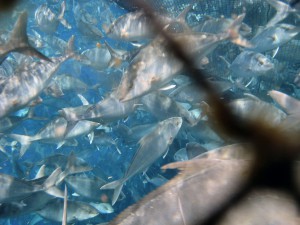
Scientists with NOAA’s National Centers for Coastal Ocean Science (NCCOS) found that fish farm effects on dissolved oxygen and turbidity have been largely eliminated through better management, like using formulated feeds, minimizing feed waste, and properly siting farms in deep waters with flushing currents. The trend toward moving industrial-scale aquaculture into offshore waters is increasingly feasible as cage and farm structure technology emerges to withstand the harsh conditions of the open ocean. Led by the NCCOSCoastal Aquaculture Planning and Environmental Sustainability (CAPES) Programin partnership with the Scottish Association of Marine Science, the findings will be published in Aquaculture Environment Interactions in early February.Advances in marine aquaculture technology and modern siting and management practices minimize the impacts of individual fish farms on water quality and primary production, promoting a sustainable source of seafood with fewer environmental impacts.
The published article can be found here.
For more information contact: James.Morris@noaa.gov or Carol.Price@noaa.gov.
